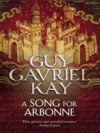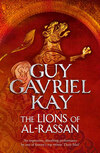Читать книгу: «Sailing to Sarantium»

Sailing to Sarantium
Book One of The Sarantine Mosaic
GUY GAVRIEL KAY

For my sons, Samuel Alexander and Matthew Tyler, with love, as I watch them
‘... fashion everything From nothing every day, and teach The morning stars to sing.’
. . . and we knew not whether we were in heaven or on earth. For on earth there is no such splendour or such beauty, and we were at a loss how to describe it. We know only that God dwells there among men, and their service is fairer than the ceremonies of other nations. For we cannot forget that beauty.
—Chronicle of the Journey of Vladimir, Grand Prince of Kiev, to Constantinople
Contents
Cover
Title Page
Epigraph
Prologue
Part One
Chapter I
Chapter II
Chapter III
Chapter IV
Chapter V
Part Two
Chapter VI
Chapter VII
Chapter VIII
Chapter IX
Chapter X
Acknowledgments
About the Author
Also by Guy Gavriel Kay
Copyright
About the Publisher
Prologue
Thunderstorms were common in Sarantium on midsummer nights, sufficiently so to make plausible the oft-repeated tale that the Emperor Apius passed to the god in the midst of a towering storm, with lightning flashing and rolls of thunder besieging the Holy City. Even Pertennius of Eubulus, writing only twenty years after, told the story this way, adding a statue of the Emperor toppling before the bronze gates to the Imperial Precinct and an oak tree split asunder just outside the landward walls. Writers of history often seek the dramatic over the truth. It is a failing of the profession.
In fact, on the night Apius breathed his last in the Porphyry Room of the Attenine Palace there was no rain in the City. An occasional flash of lightning had been seen and one or two growls of thunder heard earlier in the evening, well north of Sarantium, towards the grain-lands of Trakesia. Given the events that followed, that northern direction might have been seen as portent enough.
The Emperor had no living sons, and his three nephews had rather spectacularly failed a test of their worthiness less than a year before and had suffered appropriate consequences. There was, as a result, no Emperor Designate in Sarantium when Apius heard—or did not hear—as the last words of his long life, the inward voice of the god saying to him alone, ‘Uncrown, the Lord of Emperors awaits you now.’
The three men who entered the Porphyry Room in the still-cool hour before dawn were each acutely aware of a dangerously unstable situation. Gesius the eunuch, Chancellor of the Imperial Court, pressed his long, thin fingers together piously, and then knelt stiffly to kiss the dead Emperor’s bare feet. So, too, after him, did Adrastus, Master of Offices, who commanded the civil service and administration, and Valerius, Count of the Excubitors, the Imperial Guard.
‘The Senate must be summoned,’ murmured Gesius in his papery voice. ‘They will go into session immediately.’
‘Immediately,’ agreed Adrastus, fastidiously straightening the collar of his ankle-length tunic as he rose. ‘And the Patriarch must begin the Rites of Mourning.’
‘Order,’ said Valerius in soldier’s tones, ‘will be preserved in the City. I undertake as much.’
The other two looked at him. ‘Of course,’ said Adrastus, delicately. He smoothed his neat beard. Preserving order was the only reason Valerius had for being in the room just now, one of the first to learn the lamentable situation. His remarks were . . . a shade emphatic.
The army was primarily east and north at the time, a large element near Eubulus on the current Bassanid border, and another, mostly mercenaries, defending the open spaces of Trakesia from the barbarian incursions of the Karchites and the Vrachae, both of whom had been quiescent of late. The strategos of either military contingent could become a decisive factor—or an Emperor— if the Senate delayed.
The Senate was an ineffectual, dithering body of frightened men. It was likely to delay unless given extremely clear guidance. This, too, the three officials in the room with the dead man knew very well.
‘I shall,’ said Gesius casually, ‘make arrangements to have the noble families apprised. They will want to pay their respects.’
‘Naturally,’ said Adrastus. ‘Especially the Daleinoi. I understand Flavius Daleinus returned to the City only two days ago.’
The eunuch was too experienced a man to actually flush.
Valerius had already turned for the doorway. ‘Deal with the nobility as you see fit,’ he said over his shoulder. ‘But there are five hundred thousand people in the City who will fear the wrath of Holy Jad descending upon a leaderless Empire when they hear of this death. They are my concern. I will send word to the Urban Prefect to ready his own men. Be thankful there was no thunderstorm in the night.’
He left the room, hard-striding on the mosaic floors, burly-shouldered, still vigorous in his sixtieth year. The other two looked at each other. Adrastus broke the shared gaze, glancing away at the dead man in the magnificent bed, and at the jewelled bird on its silver bough beside that bed. Neither man spoke.
Outside the Attenine Palace, Valerius paused in the gardens of the Imperial Precinct only long enough to spit into the bushes and note that it was still some time before the sunrise invocation. The white moon was over the water. The dawn wind was west; he could hear the sea, smell salt on the breeze amid the scent of summer flowers and cedars.
He walked away from the water under the late stars, past a jumble of palaces and civil service buildings, three small chapels, the Imperial Silk Guild’s hall and workspaces, the playing fields, the goldsmiths’ workshops, and the absurdly ornate Baths of Marisian, towards the Excubitors’ barracks near the bronze gates that led out to the City.
Young Leontes was waiting outside. Valerius gave the man precise instructions, memorized carefully some time ago in preparation for this day.
His prefect withdrew into the barracks and Valerius heard, a moment later, the sounds of the Excubitors— his men for the last ten years—readying themselves. He drew a deep breath, aware that his heart was pounding, aware of how important it was to conceal any such intensities. He reminded himself to send a man running to inform Petrus, outside the Imperial Precinct, that Jad’s Holy Emperor Apius was dead, that the great game had begun. He offered silent thanks to the god that his own sister-son was a better man, by so very much, than Apius’s three nephews.
He saw Leontes and the Excubitors emerging from the barracks into the shadows of the pre-dawn hour. His features were impassive, a soldier’s.
It was to be a race day at the Hippodrome, and Astorgus of the Blues had won the last four races run at the previous meeting. Fotius the sandalmaker had wagered money he couldn’t afford to lose that the Blues’ principal chario -teer would win the first three races today, making a lucky seven in a row. Fotius had dreamt of the number twelve the night before, and three quadriga races meant Astorgus would drive twelve horses, and when the one and the two of twelve were added together . . . why, they made a three again! If he hadn’t seen a ghost on the roof of the colonnade across from his shop yesterday afternoon, Fotius would have felt entirely sure of his wager.
He had left his wife and son sleeping in their apartment above the shop and made his way cautiously—the streets of the City were dangerous at night, as he had cause to know—towards the Hippodrome. It was long before sunrise; the white moon, waning, was west towards the sea, floating above the towers and domes of the Imperial Precinct. Fotius couldn’t afford to pay for a seat every time he came to the racing, let alone one in the shaded parts of the stands. Only ten thousand places were offered free to citizens on a race day. Those who couldn’t buy, waited.
Two or three thousand others were already in the open square when he arrived under the looming dark masonry of the Hippodrome. Just being here excited Fotius, driving away a lingering sleepiness. He hastily took a blue tunic from his satchel and pulled it on in exchange for his ordinary brown one, modesty preserved by darkness and speed. He joined a group of others similarly clad. He had made this one concession to his wife after a beating by Green partisans two years before during a particularly wild summer season: he wore unobtrusive garb until he reached the relative safety of his fellow Blues. He greeted some of the others by name and was welcomed cheerfully. Someone passed him a cup of cheap wine and he took a drink and passed it along.
A tipster walked by selling a list of the day’s races and his predictions. Fotius couldn’t read, so he wasn’t tempted, though he saw others handing over two copper folles for a sheet. Out in the middle of the Hippodrome Forum a Holy Fool, half naked and stinking, had staked a place and was already haranguing the crowd about the evils of racing. The man had a good voice and offered some entertainment . . . if you didn’t stand downwind. Street vendors were already selling figs and Candaria melons and grilled lamb. Fotius had packed himself a wedge of cheese and some of the bread ration from the day before. He was too excited to be hungry, in any case.
Not far away, near their own entrance, the Greens were clustered in similar numbers. Fotius didn’t see Pappio the glassblower among them, but he knew he’d be there. He’d made his bet with Pappio. As dawn approached, Fotius began—as usual—to wonder if he’d been reckless with his wager. That spirit he’d seen, in broad daylight . . .
It was a mild night for summer, with a sea wind. It would be very hot later, when the racing began. The public baths would be crowded at the midday interval, and the taverns.
Fotius, still thinking about his wager, wondered if he ought to have stopped at a cemetery on the way with a curse-tablet against the principal Green charioteer, Scortius. It was the boy, Scortius, who was likeliest to stand—or drive—today between Astorgus and his seven straight triumphs. He’d bruised his shoulder in a fall in mid-session last time, and hadn’t been running when Astorgus won that magnificent four-in-a-row at the end of the day.
It offended Fotius that a dark-skinned, scarcely bearded upstart from the deserts of Ammuz—or wherever he was from—could be such a threat to his beloved Astorgus. He ought to have bought the curse-tablet, he thought ruefully. An apprentice in the linen guild had been knifed in a dockside caupona two days before and was newly buried: a perfect chance for those with tablets to seek intercession at the grave of the violently dead. Everyone knew that made the inscribed curses more powerful. Fotius decided he’d have only himself to blame if Astorgus failed today. He had no idea how he’d pay Pappio if he lost. He chose not to think about that, or about his wife’s reaction.
‘Up the Blues!’ he shouted suddenly. A score of men near him roused themselves to echo the cry.
‘Up the Blues in their butts!’ came the predictable reply from across the way.
‘If there were any Greens with balls!’ a man beside Fotius yelled back. Fotius laughed in the shadows. The white moon was hidden now, over behind the Imperial Palaces. Dawn was coming, Jad in his chariot riding up in the east from his dark journey under the world.
And then the mortal chariots would run, in the god’s glorious name, all through a summer’s day in the holy city of Sarantium. And the Blues, Jad willing, would triumph over the stinking Greens, who were no better than barbarians or pagan Bassanids or even Kindath, as everyone knew.
‘Look,’ someone said sharply, and pointed.
Fotius turned. He actually heard the marching footsteps before he saw the soldiers appear, shadows out of the shadows, through the Bronze Gate at the western end of the square.
The Excubitors, hundreds of them, armed and armoured beneath their gold-and-red tunics, came into the Hippodrome Forum from the Imperial Precinct. That was unusual enough at this hour to actually be terrifying. There had been two small riots in the past year, when the more rabid partisans of the two colours had come to blows. Knives had appeared, and staves, and the Excubitors had been summoned to help the Urban Prefect’s men quell them. Quelling by the Imperial Guard of Sarantium was not a mild process. A score of dead had strewn the stones afterwards both times.
Someone else said, ‘Holy Jad, the pennons!’ and Fotius saw, belatedly, that the Excubitors’ banners were lowered on their staffs. He felt a cold wind blow through his soul, from no direction in the world.
The Emperor was dead.
Their father, the god’s beloved, had left them. Sarantium was bereft, forsaken, open to enemies east and north and west, malevolent and godless. And with Jad’s Emperor gone, who knew what daemons or spirits from the half-world might now descend to wreak their havoc among helpless mortal men? Was this why he’d seen a ghost? Fotius thought of plague coming again, of war, of famine. In that moment he pictured his child lying dead. Terror pushed him to his knees on the cobbles of the square. He realized that he was weeping for the Emperor he had never seen except as a distant, hieratic figure in the Imperial Box in the Hippodrome.
Then—an ordinary man living his days in the world of ordinary men—Fotius the sandalmaker understood that there would be no racing today. That his reckless wager with the glassblower was nullified. Amid terror and grief, he felt a shaft of relief like a bright spear of sunlight. Three races in a row? It had been a fool’s wager, and he was quit of it.
There were many men kneeling now. The Holy Fool, seeing an opportunity, had raised his voice in denunciation—Fotius couldn’t make him out over the babble of noise, so he didn’t know what the man was decrying now. Godlessness, licence, a divided clergy, heretics with Heladikian beliefs. The usual litanies. One of the Excubitors strode over to him and spoke quietly. The holy man ignored the soldier, as they usually did. But then Fotius, astonished, saw the ascetic dealt a slash across the shins with a spear shaft. The ragged man let out a cry—more of surprise than anything else—and fell to his knees, silent.
Over the wailing of the crowd another voice rose then, stern and assured, compelling attention. It helped that the speaker was on horseback, the only mounted man in the forum.
‘Hear me! No harm will come to anyone here,’ he said, ‘if order is preserved. You see our banners. They tell their tale. Our glorious Emperor, Jad’s most dearly beloved, his thrice-exalted regent upon earth, has left us to join the god in glory behind the sun. There will be no chariots today, but the Hippodrome gates will be opened for you to take comfort together while the Imperial Senate assembles to proclaim our new Emperor.’
A louder murmur of sound. There was no heir; everyone knew it. Fotius saw people streaming into the forum from all directions. News of this sort would take no time at all to travel. He took a breath, struggling to hold down a renewed panic. The Emperor was dead. There was no Emperor in Sarantium.
The mounted man again lifted a hand for stillness. He sat his horse straight as a spear, clad as his soldiers were. Only the black horse and a border of silver on his over -tunic marked his rank. No pretension here. A peasant from Trakesia, a farmer’s son come south as a lad, rising in the army ranks through hard work and no little courage in battle. Everyone knew this tale. A man among men, that was the word on Valerius of Trakesia, Count of the Excubitors.
Who now said, ‘There will be clerics in all the chapels and sanctuaries of the City, and others will join you here, to lead mourning rites in the Hippodrome under Jad’s sun.’ He made the sign of the sun disk.
‘Jad guard you, Count Valerius!’ someone cried.
The man on the horse appeared not to hear. Bluff and burly, the Trakesian never courted the crowd as others in the Imperial Precinct did. His Excubitors did their duties with efficiency and no evident partisanship, even when men were crippled and sometimes killed by them. Greens and Blues were dealt with alike, and sometimes even men of rank, for many of the wilder partisans were sons of aristocracy. No one even knew which faction Valerius preferred, or what his beliefs were, in the manifold schisms of Jaddite faith, though there was the usual speculation. His nephew was a patron of the Blues, that was known, but families often divided between the factions.
Fotius thought about going home to his wife and son after morning prayers at the little chapel he liked, near the Mezaros Forum. There was a greyness in the eastern sky. He looked over at the Hippodrome and saw that the Excubitors, as promised, were opening the gates.
He hesitated, but then he saw Pappio the glass-blower standing a little apart from the other Greens, alone in an empty space. He was crying, tears running into his beard. Fotius, moved by entirely unexpected emotion, walked over to the other man. Pappio saw him and wiped at his eyes. Without a word spoken the two of them walked side by side into the vastness of the Hippodrome as the god’s sun rose from the forests and fields east of Sarantium’s triple landward walls and the day began.
Plautus Bonosus had never wanted to be a Senator. The appointment, in his fortieth year, had been an irritant more than anything else. Among other things, there was an outrageously antiquated law that Senators could not charge more than six per cent on loans. Members of the ‘Names’—the aristocratic families entered on the Imperial Records—could charge eight, and everyone else, even pagans and the Kindath, were allowed ten. The numbers were doubled for marine ventures, of course, but only a man possessed by a daemon of madness would venture moneys on a merchant voyage at twelve per cent. Bonosus was hardly a madman, but he was a frustrated businessman, of late.
Senator of the Sarantine Empire. Such an honour! Even his wife’s preening irked him, so little did she understand the way of things. The Senate did what the Emperor told it to do, or what his privy counsellors told it; no less, and certainly no more. It was not a place of power or any legitimate prestige. Perhaps once it had been, back in the west, in the earliest days after the founding of Rhodias, when that mighty city first began to grow upon its hill and proud, calm men—pagans though they might have been—debated the best way to shape a realm. But by the time Rhodias in Batiara was the heart and hearth of a world-spanning Empire—four hundred years ago, now— the Senate there was already a compliant tool of the Emperors in their tiered palace by the river.
Those fabled palace gardens were clotted with weeds now, strewn with rubble, the Great Palace sacked and charred by fire a hundred years ago. Sad, shrunken Rhodias was home to a weak High Patriarch of Jad and conquering barbarians from the north and east—the Antae, who still used bear grease in their hair, it was reliably reported.
And the Senate here in Sarantium now—the New Rhodias—was as hollow and complaisant as it had been in the western Empire. It was possible, Bonosus thought grimly, as he looked around the Senate Chamber with its elaborate mosaics on floor and walls and curving across the small, delicate dome, that those same savages who had looted Rhodias—or others worse than them—might soon do the same here where the Emperors now dwelled, the west being lost and sundered. A struggle for succession exposed any empire, considerably so.
Apius had reigned thirty-six years. It was hard to believe. Aged, tired, in the spell of his cheiromancers the last years, he had refused to name an heir after his nephews had failed the test he’d set for them. The three of them were not even a factor now—blind men could not sit the Golden Throne, nor those visibly maimed. Slit nostrils and gouged eyes ensured that Apius’s exiled sister-sons need not be considered by the Senators.
Bonosus shook his head, irked with himself. He was following lines of thought that suggested there was an actual decision to be made by the fifty men in this chamber. In reality, they were simply going to ratify whatever emerged from the intrigues taking place even now within the Imper ial Precinct. Gesius the Chancellor, or Adrastus, or Hilarinus, Count of the Imperial Bedchamber, would come soon enough and inform them what they were to wisely decide. It was a pretence, a piece of theatre.
And Flavius Daleinus had returned to Sarantium from his family estates across the straits to the south just two days before. Most opportunely.
Bonosus had no quarrel with any of the Daleinoi, or none that he knew of, at any rate. This was good. He didn’t much care for them, but that was hardly the issue when a merchant of modestly distinguished lineage considered the wealthiest and most illustrious family in the Empire.
Oradius, Master of the Senate, was signalling for the session to begin. He was having little success amid the tumult in the chamber. Bonosus made his way to his bench and sat down, bowing formally to the Master’s Seat. Others noticed and followed his example. Eventually there was order. At which point Bonosus became aware of the mob at the doors.
The pounding was heavy, frightening, rocking the doors, and with it came a wild shouting of names. The citizens of Sarantium appeared to have candidates of their own to propose to the distinguished Senators of the Empire.
It sounded as if there was fighting going on. What a surprise, Bonosus thought sardonically. As he watched, fascinated, the ornately gilded doors of the Senate Chamber—part of the illusion that matters of moment transpired here—actually began to buckle under the hammering from without. A splendid symbol, Bonosus thought: the doors looked magnificent, but yielded under the least pressure. Someone farther along the bench let out an undignified squeal. Plautus Bonosus, having a whimsical turn of mind, began to laugh.
The doors crashed open. The four guards fell backwards. A crowd of citizens—some slaves among them— thrust raucously into the chamber. Then the vanguard stopped, overawed. Mosaics and gold and gems had their uses, Bonosus thought, amused irony still claiming him. The torch-bearing image of Heladikos, riding his chariot towards his father the Sun—an image of no little controversy in the Empire today—looked down from the dome.
No one in the Senate Chamber seemed able to form a response to the intrusion. The crowd milled about, those still outside pushing forward, those in the chamber holding back, unsure of what they wanted to do now that they were here. Both factions—Blues and Greens— were present. Bonosus looked at the Master. Oradius remained bolted to his seat, making no motion at all. Suppressing his amusement, Bonosus gave an inward shrug and stood.
‘People of Sarantium,’ he said gravely, extending both hands, ‘be welcome! Your aid in our deliberations in this difficult time will be invaluable, I am certain. Will you honour us with those names that commend themselves to you as worthy to sit on the Golden Throne, before you withdraw and allow us to seek Jad’s holy guidance in our weighty task?’
It took very little time, actually.
Bonosus had the Registrar of the Senate dutifully repeat and record each one of the shouted names. There were few surprises. The obvious strategoi, equally obvious nobility. Holders of Imperial Office. A chariot racer. Bonosus, his outward manner sober and attentive, had this name recorded, as well: Astorgus of the Blues. He could laugh about that afterwards.
Oradius, evident danger past, roused himself to a fulsome speech of gratitude in his rich, round tones. It seemed to go over well enough, though Bonosus rather doubted the rabble in the chamber understood half of what was being said to them in the archaic rhetoric. Oradius asked the guards to assist the Empire’s loyal citizenry from the chamber. They went—Blues, Greens, shopkeepers, apprentices, guildsmen, beggars, the many-raced sortings of a very large city.
Sarantines weren’t especially rebellious, Bonosus thought wryly, so long as you gave them their free bread each day, let them argue about religion, and provided their beloved dancers and actors and charioteers.
Charioteers, indeed. Jad’s Most Holy Emperor Astorgus the Charioteer. A wonderful image! He might whip the people into line, Bonosus thought, briefly amusing himself again.
His flicker of initiative spent, Plautus Bonosus leaned sideways on his bench, propped on one hand, and waited for the emissaries from the Imperial Precinct to come and tell the Senators what they were about to think.
It turned out to be a little more complex than that, however. Murder, even in Sarantium, could sometimes be a surprise.
In the better neighbourhoods of the City it had become fashionable in the previous generation to add enclosed balconies to the second and third storeys of houses or apartments. Reaching out over the narrow streets, these sun rooms now had the ironic, if predictable, effect of almost completely blocking the sunlight, all in the name of status and in order to afford the womenfolk of the better families a chance to view the street life through beaded curtains or sometimes extravagant window openings, without themselves suffering the indignity of being observed.
Under the Emperor Apius, the Urban Prefect had passed an ordinance forbidding such structures to project more than a certain distance from the building walls, and had followed this up by tearing down a number of solaria that violated the new law. Needless to say, this did not happen on the streets where the genuinely wealthy and influential kept their city homes. The power of one patrician to complain tended to be offset by the ability of another to bribe or intimidate. Private measures, of course, could not be entirely forestalled, and some regrettable incidents had unfortunately taken place over the years, even in the best neigh-bourhoods.
IN ONE SUCH STREET, lined with uniformly handsome brick façades and with no shortage of lanterns set in the exterior walls to offer expensive lighting at night, a man now sits in a flagrantly oversized solarium, alternately watching the street below and the exquisitely slow, graceful movements of a woman as she plaits and coils her hair in the bedroom behind him.
Her lack of self-consciousness, he thinks, is an honour of sorts extended to him. Sitting unclothed on the edge of the bed, she displays her body in a sequence of curves and recesses: uplifted arm, smooth hollow of arm, honey-coloured amplitude of breast and hip, and the lightly downed place between her thighs where he has been welcomed in the night just past.
The night a messenger came to report an Emperor dead.
As it happens, he is wrong about one thing: her absorbed, unembarrassed nakedness has more to do with self-directed ease than any particular emotion or feeling associated with him at this moment. She is not, after all, unused to having her body seen by men. He knows this, but prefers, at times, to forget it.
He watches her, smiling slightly. He has a smooth-shaven, round face with a soft chin and grey, observant eyes. Not a handsome or an arresting man, he projects a genial, uncontentious, open manner. This is, of course, useful.
Her dark brown hair, he notes, has become tinged with red through the course of the summer. He wonders when she’s had occasion to be outside enough for that to happen, then realizes the colour might be artificial. He doesn’t ask. He is not inclined to probe the details of what she does when they are not together in this apartment he has bought for her on a carefully chosen street.
That reminds him of why he is here just now. He looks away from the woman on the bed—her name is Aliana— and back out through the beaded curtains over the street. Some movement, for the morning is advanced and the news will have run through Sarantium by now.
The doorway he is watching remains closed. There are two guards outside it, but there always are. He knows the names of these two, and the others, and their backgrounds. Details of this sort can sometimes matter. Indeed, they tend to matter. He is careful in such things, and less genial than might appear to the unsubtle.
A man had entered through that doorway, his bearing urgent with tidings, just before sunrise. He had watched this by the light of the exterior torches, and had noted the livery. He had smiled then. Gesius the Chancellor had chosen to make his move. The game was begun, indeed. The man in the solarium expects to win it but is experienced enough in the ways of power in the world, already, to know that he might not. His name is Petrus.
‘You are tired of me,’ the woman says, ending a silence. Her voice is low, amused. The careful movements of her arms, attending to her hair, do not cease. ‘Alas, the day has come.’
‘That day will never come,’ the man says calmly, also amused. This is a game they play, from within the entirely improbable certainty of their relationship. He does not turn from watching the doorway now, however.
‘I will be on the street again, at the mercy of the factions. A toy for the wildest partisans with their barbarian ways. A cast-aside actress, disgraced and abandoned, past my best years.’
She was twenty in the year when the Emperor Apius died. The man has seen thirty-one summers; not young, but it was said of him—before and after that year—that he was one of those who had never been young.
Начислим
+44
Покупайте книги и получайте бонусы в Литрес, Читай-городе и Буквоеде.
Участвовать в бонусной программе



















